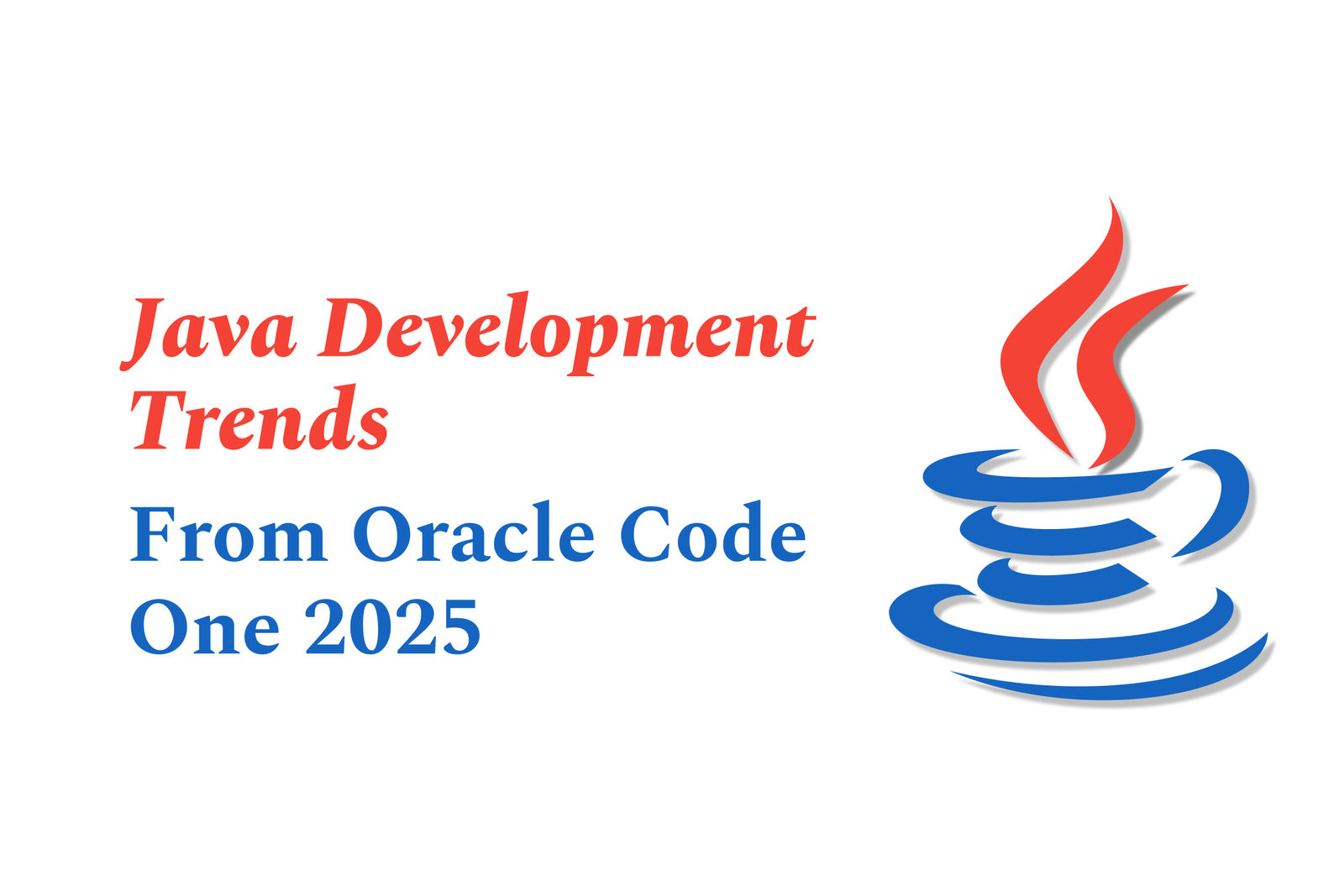Java Development Trends from Oracle Code One 2025
Oracle Code One 2025 highlights cutting-edge Java development trends, showcasing innovations like Project Loom for lightweight concurrency, Project Valhalla’s value types, enhanced performance features, and new APIs, reinforcing Java’s role as a modern, robust platform for enterprise and cloud applications.
Java Development Trends From Oracle Code One 2025
1 ) Java's Enduring Popularity and Relevance in 2025
Despite being nearly three decades old, Java remains an extremely popular and widely used programming language in 2025. Over 90% of Fortune 500 companies employ Java, and it consistently ranks among the top ten programming languages globally. Frequent releases every six months have kept Java fresh, attracting ongoing developer interest.
2 ) Key Announcements from Oracle Code One
Oracle continues its commitment to Java's stewardship, focusing on performance, reliability, security, and a rich ecosystem suited for modern application development. At the conference, Oracle showcased exciting ongoing projects and recent platform updates that reinforce Java’s position in the developer community.
3 ) Major Innovation Projects Shaping Java’s Future
Project Valhalla: Introducing value types and generic specialization to optimize memory and improve performance through cache friendly data structures.
Project Panama: Enhancing interoperability by creating robust connections between Java and non Java (foreign) code and data.
Project Amber: Bringing productivity oriented language features like raw string literals, switch expressions, pattern matching, and records to simplify coding.
Project Loom: Introducing lightweight user mode threads (“fibers”) to enable efficient, simplified concurrent programming.
4 ) Recent Java SE 11 Features and Improvements
Released on September 25, Java SE 11 brought several significant upgrades such as:
New HTTP Client API supporting HTTP/2 and WebSocket protocols.
Flight Recorder for low overhead data collection useful in troubleshooting and diagnostics.
Running Java programs directly from a single source file to streamline learning and development.
TLS 1 )3 implementation for enhanced security and performance.
ZGC (Z Garbage Collector), a low latency, experimental garbage collector capable of handling massive heaps with minimal pause times.
5 ) Community and Ecosystem Highlights
Oracle recognized innovations with the Duke’s Choice Awards, celebrating advances in Java tools, open source projects, and community driven initiatives. Notable mentions included self driving car projects, enhancements in Apache NetBeans, and initiatives like Eclipse MicroProfile and Project Helidon that promote microservice and cloud development.
Summary:
Oracle Code One 2025 reaffirms Java’s continual evolution and its vital role in enterprise and modern software development. With major projects overhauling performance, language features, and concurrency models, along with steady ecosystem enhancements, Java maintains its edge as a powerful, flexible, and stable platform for developers worldwide.
https://justacademy.in/news-detail/react-native-2025:-what-meta?s-big-push-means-for-developers
https://justacademy.in/news-detail/flutter-roadmap-beyond-2025
https://justacademy.in/news-detail/why-react-native?s-developer-salaries-are-rising
https://justacademy.in/news-detail/how-react-native-is-powering-the-next-generation-of-desktop-apps
https://justacademy.in/news-detail/how-ai-is-revolutionizing-react-native-app-development
Related Posts
In 2025, top Angular libraries offer modern, feature-rich components and tools for building dynamic web apps. From powerful data grids to low-code platforms like UI Bakery, these libraries enhance development speed, UI design, and scalability, making them essential for Angular developers.
Migrating from AngularJS to Angular 17 involves gradually upgrading your app by running both frameworks together using tools like ngUpgrade, rewriting components in TypeScript, and adopting Angular’s modern architecture to enhance performance, maintainability, and long-term support.
Angular state management tools help organize and handle app data efficiently, improving scalability and maintainability. Popular options include NgRx for robust, RxJS-based patterns, and newer Signal Store solutions that offer simpler, reactive approaches integrated tightly with Angular’s latest features.
RxJS in Angular empowers developers to manage asynchronous data streams with powerful operators like `forkJoin`, `combineLatest`, and `zip`. Mastering these key operators in 2025 is essential for building efficient, reactive applications that handle complex event sequences seamlessly.
Angular performance optimization in 2025 focuses on improving app speed and responsiveness by using techniques like OnPush change detection, lazy loading, efficient data caching, and AOT compilation. These practices reduce load times, enhance user experience, and ensure scalable, fast Angular applications.
In 2025, Angular remains preferred for large-scale, enterprise apps with its robust, all-in-one framework, while Vue attracts developers seeking simplicity and fast development for smaller projects. Both frameworks excel, with choice driven by project needs and team expertise.
Angular Signals are a new reactive primitive in Angular 16 that enable fine-grained, efficient change detection by automatically tracking dependencies and updating only affected parts of the UI. They simplify state management and boost app performance, revolutionizing Angular's reactivity model.
Angular interview questions to prepare in 2025 focus on core concepts like components, directives, data binding, routing, and dependency injection, along with TypeScript mastery and latest Angular features to ensure strong practical knowledge for building scalable, efficient web applications.
AngularJS reached its official end of support in January 2022, meaning no further updates or security patches. To ensure app security and performance, developers should consider migrating to modern Angular versions or seek third-party long-term support options if immediate migration isn’t possible.
The Angular Roadmap 2025 highlights upcoming features focused on improving developer experience and performance, including zoneless Angular, Signals integration, enhanced Forms, async data handling, improved HMR, and expanded Angular Material/CDK enhancements, driving modern, efficient web app development.










